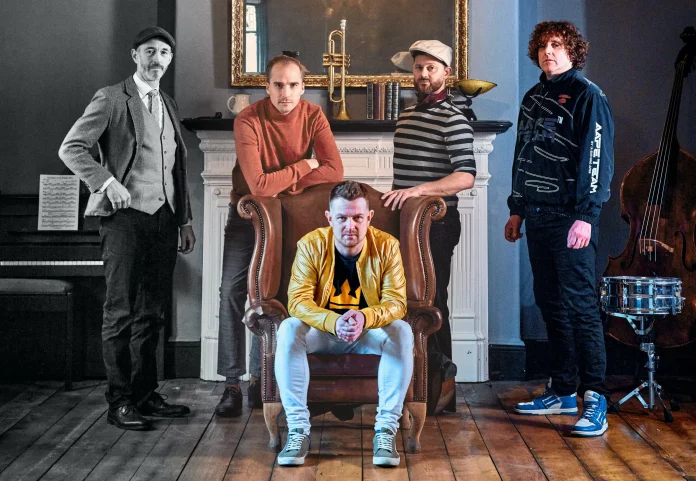In the 1950s there were the Jazz Messengers, announcing the arrival of hard bop. Seven decades on, it’s a case of preserving the genre, and that’s the mission of The Jazz Defenders – the West Country quintet led by pianist George Cooper. The familiar front-line partnership of tenor saxophone and trumpet in full spate, with bomb-dropping drums and an ever-rolling keyboard and bass, are associated with a certain kind of Charlie Parker-derived composition, usually fast and furious.
Cooper refreshes the style, though, providing originality in exciting and exacting charts, making much of the formal personnel and what it’s expected to accomplish, and splitting that two-horn amalgam into a pairing whose constituents feed off each other in a manner that commands attention and admiration.
The results can be heard on the band’s third and current album, Memory In Motion, which it’s been promoting on tour at home and away. Half of it was performed at Abergavenny’s Black Mountain Jazz club (BMJ) before a full and enthusiastic house.
At the gig, Cooper announced that the album had reached number 10 in the USA’s Jazz Week chart, which is based on the number of nationwide radio plays and updated each Thursday. (The band’s first album, Scheming, reached number seven last year.) Introduced to London at Pizza Express, Soho in April, Memory In Motion is still doing the rounds, boosted by warm critical approval.
But, hang on – haven’t we heard this kind of jazz many times before, and is Cooper’s albeit commendable take enough to remove the echoes that sometimes arise from an historical artefact?
It was interesting to find the strict Parkeresque antecedents of hard bop limited to the encore – Hawkeye Jorge, from the band’s debut album – with a couple of choruses each from the principals and a “shout” finale from all-action drummer Ian Matthews. It indicated how much, in the previous tracks, that tradition had been subverted by Matthews-dictated variations in pulse, his often windmilling style drawn from more than Art Blakey & Co.
The metronome didn’t get much rest when the album’s witty charts were being written and the touring programme compiled. Most of the numbers are by Cooper. It was a case of get-up-and-go – and some. In a live performance with its choruses fit for lengthening, this might have been burdensome for trumpeter Nick Malcolm and tenor saxophonist Jake McMurchie, but their solos were bristling and sustained and their duo heads probing, crisply articulated and always moving onwards and outwards.
Cooper, sitting ’twixt BMJ’s open upright and a Nord S3 keyboard doubling piano and organ, had his own manner of attracting attention, from lapsing into half-time on bassist Will Harris’s Fuffle Kershuffle, with its perimeter reflecting something by Bobby Timmons, to connecting a minimalist intro to a two-fisted conclusion on Costa Del Lol and, on Meanderthal (from the latest album), linking upright and keyboard in organ mode. Snakebite Playfight included some wild piano attacks as befitted the chart’s provenance – so Cooper disclosed – in the imbibing of a potent Devon tipple and the aftermath of so doing. Harris, doubling upright and electric bass, was everywhere the seemingly unobtrusive rock supporting a lot of hyperactivity, his veteran stature and composure key to the outcomes.
Half the pieces at Abergavenny were from the latest album, the rest from the previous two. As is often the case, the live reproduction of jazz-album charts has an edge made keener by an eager and responsive audience. BMJ provided that; as a flag-flyer for so-called “Blue Note” music, Cooper and friends provided changing shades of ultramarine.
Top-notch playing by a band that might have been setting out on tour, not coming to the end of it.
***
The Jazz Defenders at Melville Centre for the Arts, Abergavenny, 19 May 2024. George Cooper (p, kyb); Nick Malcolm (t); Jake McMurchie (ts); Will Harris (b, elb); Ian Matthews (d).
















